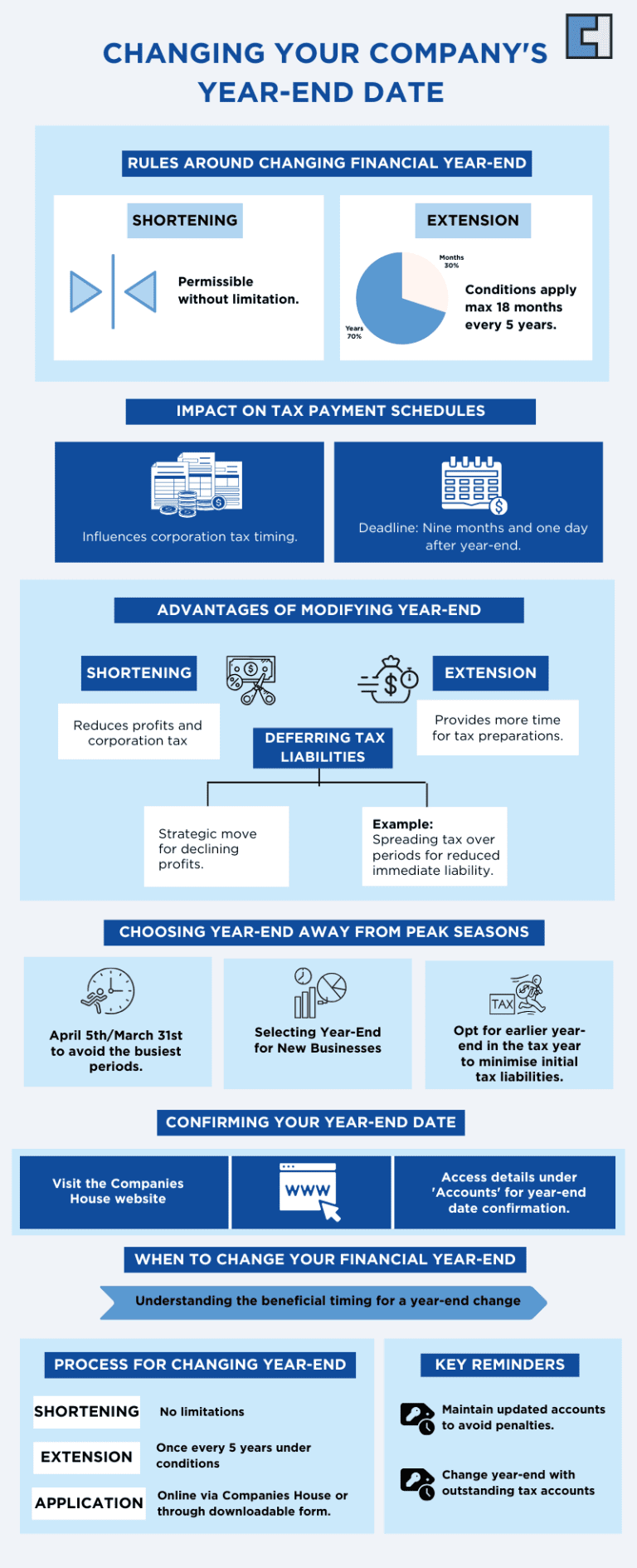The simple answer is Yes! It is possible. In the UK, the default fiscal year, also called the tax year, spans April 6th to April 5th. However, for companies, it is 12 months of any part of the year, it can also span two years partially, but the good thing is that companies have the discretion to change their year-end dates.
Choosing an accounting year-end date for your company is flexible, but there are critical factors that you can consider to make sure it aligns with your business needs.
Understanding the term ‘Financial Year-End’
Financial year-end, fiscal year-end, or accounting year-end are used synonymously, and these terms mark the conclusion of a company’s 12-month accounting cycle. Things can get tricky when a company’s accounting period exceeds the 12-month period. However, this is only the case in certain circumstances, and most companies have a single 12-month accounting period.
After Starting a Business and once it is registered for corporation tax, HMRC will issue a letter containing your company’s Unique Taxpayer Reference (UTR). New businesses must register for corporation tax within three months of operations, which can be done online or at the point when the Limited Company is set up.
Your Guide to Starting a Business in the UK: From UTR to LLCs
Determining Your Financial Year-End Date
By default, when a new company is formed, its financial year-end will be set to a span of 12 months following the company’s formation date. Unless changed, your company’s year-end will automatically end 12 months after its incorporation date, and that will be its year-end date for its entire life.
You can select any date for your company’s year-end, but it’s essential to consider how this decision will impact tax payments.

Rules Around Changing a Company’s Financial Year-End
Alteration of a company’s year-end impacts a company’s accounts’ filing deadline as well unless the modification extends the initial financial year. Specific regulations governing company year-end changes, often called its ‘accounting reference date,’ exist. Typically, this date is determined based on the company’s incorporation date.
Shortening a company’s financial year is permissible without limitation, with the minimum period for shortening being 1 day.
Extending A Company’s Financial Year Is Subject To The Following Conditions
- A maximum extension of up to 18 months is allowed, except in cases where the company is in administration, allowing for a longer extension.
- Extensions can occur once every 5 years.
- Circumstances permitting more frequent extensions than the stipulated 5-year interval include instances where the company is in administration, aligning dates with a subsidiary or parent company, or upon obtaining special permission from Companies House.
Impact on Tax Payment Schedules and Accounts Filing
When you change the year-end date, the date selected for your company’s year-end influences the timing of corporation tax payments, which are due nine months and one day after the end of your financial year.
The accounting filling due date will also change, as it is 9 months after the year-end. Therefore, changing a year-end date means changing your accounts’ filing deadline date. There will, however, be no impact on the date a confirmation statement has to be submitted to Companies House.
Advantages of Modifying Your Company’s Year-End
Adjusting your year-end date can shorten the accounting period, potentially reducing profits and the corresponding corporation tax. Alternatively, extending the date beyond 12 months provides more time to prepare for tax responsibilities. This is where your accounting period exceeds 12 months, and you might have to prepare two separate corporation tax returns to cover the full accounting period. It is always advisable to speak to your tax accountant for further details.
For growing startups, an earlier year-end can help manage tax bills and facilitate financial management, including tax obligations.
Deferring Tax Liabilities
Changing the accounting period can be a strategic move to defer tax liabilities, especially when declining profits. Timing can be crucial with the UK Corporation Tax rate set to increase from 19% to 25% for profits above £50,000 from April 2023 while maintaining a 19% rate for profits under £50,000.
For instance, if a company earns a profit of £45,000 for its 12-month accounting period but then loses £18,000 in the next six months after the year-end, the tax due on its accounting period profit would be based on the £45,000 only. However, if the accounts are prepared for 18 months instead of the 12-month accounting period, the tax is spread over the two periods, reducing the immediate liability due to the extra £18,000 loss now part of the overall tax calculation.
Choosing a Year-End Away from Peak Seasons
Many UK businesses opt for April or March as their year-end months to avoid busy periods, like summer or Christmas, ensuring that accounting activities do not disrupt peak business operations.
Selecting a Year-End for New Businesses
New ventures often choose an earlier year-end in the tax year to minimise initial tax liabilities while establishing themselves.
Confirming Your Year-End Date
To confirm your company’s year-end:
- Visit the Companies House website
- Search for your company’s registration name
- Click on your company’s name to access details, including the year-end date listed under ‘Accounts’
For those new to accounting and tax; or where a company has not hired accounting services or tax services from a professional advisor, it is crucial to understand when a year-end change could be beneficial for you.
Changing Your Company’s Year-End Date
UK businesses can shorten their accounting period multiple times but only extend it once every five years, except under certain conditions, such as aligning with a parent company, during administration, or with special permission from Companies House.
To Change Your Year-End
Apply online through Companies House, or Download, complete, and mail the application form from their website. Remember, you must change your year-end with outstanding tax accounts. Maintaining up-to-date accounts is crucial to avoid penalties









































































